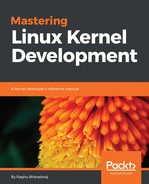Linux provides many APIs for using sequence locks, which are defined in </linux/seqlock.h>. Some of the important ones are listed here:
static inline void write_seqlock(seqlock_t *sl) { spin_lock(&sl->lock); write_seqcount_begin(&sl->seqcount); } static inline void write_sequnlock(seqlock_t *sl) { write_seqcount_end(&sl->seqcount); spin_unlock(&sl->lock); } static inline void write_seqlock_bh(seqlock_t *sl) { spin_lock_bh(&sl->lock); write_seqcount_begin(&sl->seqcount); } static inline void write_sequnlock_bh(seqlock_t *sl) { write_seqcount_end(&sl->seqcount); spin_unlock_bh(&sl->lock); } static inline void write_seqlock_irq(seqlock_t *sl) { spin_lock_irq(&sl->lock); write_seqcount_begin(&sl->seqcount); } static inline void write_sequnlock_irq(seqlock_t *sl) { write_seqcount_end(&sl->seqcount); spin_unlock_irq(&sl->lock); } static inline unsigned long __write_seqlock_irqsave(seqlock_t *sl) { unsigned long flags; spin_lock_irqsave(&sl->lock, flags); write_seqcount_begin(&sl->seqcount); return flags; }
The following two functions are used for reading by starting and finalizing a read section:
static inline unsigned read_seqbegin(const seqlock_t *sl) { return read_seqcount_begin(&sl->seqcount); } static inline unsigned read_seqretry(const seqlock_t *sl, unsigned start) { return read_seqcount_retry(&sl->seqcount, start); }
